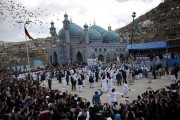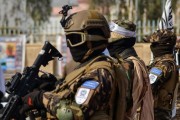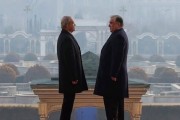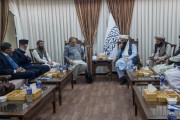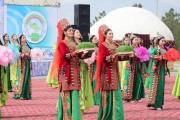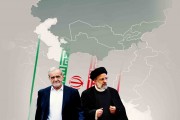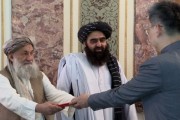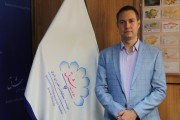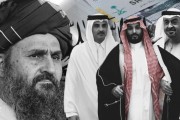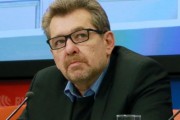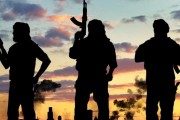Publish Date
Sunday 5 February 2023 - 09:36
recommended
0
What is the prospect of EU-Central Asia relations?
The EU sees Central Asia as a highly strategic region, neighboring powerful and/or problematic countries such as Russia, China, Afghanistan and Iran. Now more than ever, Brussels aims to help the Central Asian republics achieving autonomy and independence from Russia and China.
IESS discussion with Michael Levystone
Since the 19th century, Central Asia has become a geopolitical battleground for great powers. Its rich resources as well as its strategic location at the intersection of the most important international trade routes have attracted the attention of great powers to this region. But now, with the beginning of Russia's conflict (as the biggest supporter of Central Asian countries) in Ukraine, and also the Taliban's takeover of Afghanistan (as the southern neighbor of Central Asia), the new round of struggle for influence in Central Asia - which started after the collapse of the Soviet Union - has reached its peak. The movements of the European Union in Central Asia during the past year, along with numerous visits of EU officials to the countries of the region, can also be evaluated in the same direction.
In order to more closely examine the current developments as well as the perspective of the new round of relations between EU and the countries of Central Asia, the Institute for East Strategic Studies (IEES) has discussed with Michael Lewiston, a French expert on Russia and Central Asia affairs, and a researcher at the French Institute of International Relations (Ifri).
IESS: It seems that Europe's approach toward Central Asia has changed after the Ukraine war. In the last visits of Charles Michel, Josep Borrell, and Helga Schmid to Central Asia, this issue was evident in their literature. What is the cause of this change? Does Europe look toward Central Asia as an arena for competition with Russia, or does it have a deeper and long-term view of changing Eurasian geopolitics?
Levystone: The EU is increasingly interested in developing its ties with Central Asia, even before Russia's war in Ukraine began on February 24, 2022. The Global Gateway program outlined by the President of the European Commission, Ursula von der Leyen, in late 2021 shows the real interest of these countries to influence more in the fields of transportation, energy and communication of the world. On the other hand, since the return of the Taliban to power in Afghanistan on August 15, 2021, this country has also become one of the main issues of concern to the countries of the European Union as well as the countries of Central Asia.
Central Asia not only presents itself to Europe as an arena of competition with Russia, but also as a supplier of raw materials that can (and must, to a certain extent) replace Russia (whose oil and gas are under EU and US embargos).
IESS: Please explain more about Europe's geopolitical view of Central Asia, especially after the Ukraine war.
Levystone: The EU sees Central Asia as a highly strategic region, neighboring powerful and / or problematic countries, such as Russia, China, Afghanistan and Iran. From Brussels standpoint, there are two main interests in Central Asia in the context of Russia's war in Ukraine:
Since the 19th century, Central Asia has become a geopolitical battleground for great powers. Its rich resources as well as its strategic location at the intersection of the most important international trade routes have attracted the attention of great powers to this region. But now, with the beginning of Russia's conflict (as the biggest supporter of Central Asian countries) in Ukraine, and also the Taliban's takeover of Afghanistan (as the southern neighbor of Central Asia), the new round of struggle for influence in Central Asia - which started after the collapse of the Soviet Union - has reached its peak. The movements of the European Union in Central Asia during the past year, along with numerous visits of EU officials to the countries of the region, can also be evaluated in the same direction.
In order to more closely examine the current developments as well as the perspective of the new round of relations between EU and the countries of Central Asia, the Institute for East Strategic Studies (IEES) has discussed with Michael Lewiston, a French expert on Russia and Central Asia affairs, and a researcher at the French Institute of International Relations (Ifri).
IESS: It seems that Europe's approach toward Central Asia has changed after the Ukraine war. In the last visits of Charles Michel, Josep Borrell, and Helga Schmid to Central Asia, this issue was evident in their literature. What is the cause of this change? Does Europe look toward Central Asia as an arena for competition with Russia, or does it have a deeper and long-term view of changing Eurasian geopolitics?
Levystone: The EU is increasingly interested in developing its ties with Central Asia, even before Russia's war in Ukraine began on February 24, 2022. The Global Gateway program outlined by the President of the European Commission, Ursula von der Leyen, in late 2021 shows the real interest of these countries to influence more in the fields of transportation, energy and communication of the world. On the other hand, since the return of the Taliban to power in Afghanistan on August 15, 2021, this country has also become one of the main issues of concern to the countries of the European Union as well as the countries of Central Asia.
Central Asia not only presents itself to Europe as an arena of competition with Russia, but also as a supplier of raw materials that can (and must, to a certain extent) replace Russia (whose oil and gas are under EU and US embargos).
IESS: Please explain more about Europe's geopolitical view of Central Asia, especially after the Ukraine war.
Levystone: The EU sees Central Asia as a highly strategic region, neighboring powerful and / or problematic countries, such as Russia, China, Afghanistan and Iran. From Brussels standpoint, there are two main interests in Central Asia in the context of Russia's war in Ukraine:
* Economic interests: the region not only can provide EU with raw materials, but also serves as a bridge with China that is one of its top trade partners;
* Strategic interests: The deterioration of Afghanistan's situation can create many risks (including terrorism, immigration, drug and weapons trafficking, etc.) for many regions of the world, including Europe.
* Strategic interests: The deterioration of Afghanistan's situation can create many risks (including terrorism, immigration, drug and weapons trafficking, etc.) for many regions of the world, including Europe.
IESS: In 2019, the European Union published its new strategy for Central Asia, which had profound changes compared to the previous strategy. Now that two very important changes have happened (i.e. the rise of the Taliban in Afghanistan, and the change in the dynamics of Russian-European relations as a result of the Ukraine war) will EU still be committed to this strategy?
Levystone: The keyword of the EU new strategy for Central Asia is resilience and flexibility of the countries of this region. Now, Brussels more than ever aims at helping Central Asia's republics to gain autonomy and independence vis-a-vis Russia and China.
But is that realistic for countries that highly depend on Russia and/or China, both economically (remittances from Russia account for one third of Tajikistan and Kyrgyzstan's GDPs), and militarily (Tajikistan, Kyrgyzstan and Kazakhstan are members of the Russia-led CSTO)?
IESS: Why this program is not realistic? And whether Europe has an answer for this lack of realism in its strategy?
Levystone: Considering the economic dependence of the Central Asian countries on Russia and China, it is now very important for the European Union to increase the flexibility and resilience of these countries, as mentioned in their new strategy for Central Asia. Of course, this will take time, and (more than that) require some valid alternatives.
On the other hand, the thought-provoking trend that we have seen since the beginning of the war in Ukraine is the increase of labor migrants from Central Asia in some European countries, such as UK or Germany. Currently, it seems that the facilities available for Central Asian labor migrants in Russia are very limited, and will not be viable in the long run. Given the economic uncertainty, these are the issues that the European Union needs to work on, in order to realize its political goal of Central Asian independence from Russia.
IESS: Since 2017, Central Asian countries have been able to gain increasing independence from Russia and China. Naturally, such a trend is welcomed and promoted by the EU. However, Europe's support for the opposition of Central Asian states and strengthening their activities has been a factor in weakening this independence and the re-orientation of Republics towards Russia. How does the EU respond to this contradiction?
Levystone: EU is not that much supportive! What is the most important nowadays is the economic diplomacy. This is the factor that made "Terhi Hakala", the special representative of the European Union in Central Asia, to meet with the newly elected President of Turkmenistan, Sardar Berdimuhamedov, last spring. Currently, since Russia has become a kind of "poisonous economic partner" for the countries of Central Asia due to economic sanctions, there are many economic opportunities in the region that are eagerly open to new investors.
IESS: Europe hosts Ablyazov despite his numerous economic accusations. It also hosts the Islamic Renaissance Party of Tajikistan, and Group 24 in the form of political asylum. And it has created a platform for their activity against their governments. This issue has led to the protest of the authoritarian governments of Central Asia. Do you think that the authoritarian countries of the region have given up on political issues in favor of economic diplomacy?
Levystone: Have you heard any fiery criticism towards Kazakhstan during the January 2022 crisis from the Europeans? Economic interests are what matters most today: Central Asia is rich of oil, gas, uranium, rare metals, and is a crossroad among Russia, China, Iran, and Turkey (albeit more remote). Moreover, the "Afghan case" keeps on worrying EU and Central Asian countries. Much is at stake if existing communication networks are lost, and Brussels and Central Asian countries are increasingly working on this issue. Even US Assistant Secretary of State for South and Central Asian Affairs Donald Lu was vocal about Turkmenistan's contribution to "the stability in Central Asia", during his official visit to the region, in November 2022!
IESS: Russia has started a process of nuclearization of Central Asia. The agreement to build a nuclear power plant with Uzbekistan has been signed, negotiations with Kazakhstan is undergone, and feasibility studies have been carried out in Kyrgyzstan. Regarding the possible participation of French companies in some of these projects, what is EU’s view toward the nuclearization of Central Asia?
Levystone: Rosatom is building a big power plant in Jizzakh region (a northern province of Uzbekistan). Kazakhstan president Kasym-Jomart Tokaev also wants to build a power plant in his country, but this is a highly sensible political matter in a country where Soviets made several hundred nuclear tests, between 1949 and 1989. Given this historic context, I really doubt Rosatom has the upper hand in Kazakhstan.
IESS: Does Europe agree with the nuclearization of Central Asia, regardless of who builds the power plants? Or if companies other than Rusatom build them, Europe might agree with it?
Levystone: last year, France has received a delegation led by the Kazakhstan Minister of Energy. The delegation visited a power plant in our country. Business is business! I still doubt that Russia is among the first choices of Kazakhstan on this matter: France, China, and South Korea, seemingly, are better placed. The heavy weight of nuclear tests during the Soviet era still felt in Kazakhstan.
IESS: During the last year, relations between France and Central Asia have developed significantly. Paris hosted high-ranking officials from Central Asia, and important negotiations took place. What was the reason for these dense interactions: the new strategy in French foreign policy, or the course of regional developments?
Levystone: in late November 2022, French president Emmanuel Macron hosted his counterparts from Uzbekistan and Kazakhstan. In the meantime, he had a telephone conversation with Emomali Rahmon, the president of Tajikistan, who had traveled to Paris in October 2021. Undoubtedly, we are witnessing a kind of momentum in French towards Central Asia.
Of course, Paris seeks different interests in each of the countries of this region. For example, in the case of Kazakhstan, France values economic potential of it as a large country rich in oil and uranium. Astana's multifaceted diplomacy is also important to Paris, as one of the few countries that, regardless of what is happening on the Ukrainian front, continues to support dialogue with the Russian Federation.
As for Uzbekistan, France is trying to strengthen its position in a market that is increasingly opening up to Western investors. Relations between the presidents of France and Uzbekistan also seem to be excellent. The Afghanistan policy, pursued by President Mirziyoyev since 2016, is also attractive to France (and to the United States), even though Paris, unlike Tashkent, does not hold talks with the Taliban regime.
Concerning the Afghani situation, Dushanbe has the most hostile position among all countries in the region, which is a common feature with Europeans and Americans, and is a room for Tajikistan approach to distant powers (For example, the United States, in addition to giving PUMA drones, recently offered to allocate $60 million to Dushanbe to protect Tajikistan's shared border with Afghanistan).
News code:3378





